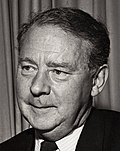8 October 1959 | |||||||||||||||||||||||||||||||||||||||||
All 71 Scottish seats to the House of Commons | |||||||||||||||||||||||||||||||||||||||||
|---|---|---|---|---|---|---|---|---|---|---|---|---|---|---|---|---|---|---|---|---|---|---|---|---|---|---|---|---|---|---|---|---|---|---|---|---|---|---|---|---|---|
| |||||||||||||||||||||||||||||||||||||||||
 Results of the 1959 election in Scotland Conservative/Unionist Labour Liberal National Liberal Independent Unionist | |||||||||||||||||||||||||||||||||||||||||
A general election was held in the United Kingdom on Thursday, 8 October 1959 and all 71 seats in Scotland were contested. [1] [2] The Unionists, who aligned with the Conservative and Unionist Party at a UK level, together with their allies the National Liberals, won the largest number of votes, but lost out in seats to the Labour Party. Across the UK as a whole, the Conservatives won 365 seats, and returned as government with a majority of 100 seats.
Contents
Jo Grimond, now party leader for the Liberals, was returned as his party's only MP, representing Orkney and Shetland. The election also saw David Robertson returned as in "Independent Unionist" for Caithness and Sutherland. Robertson was the sitting MP for the seat, having resigned from taking the Conservative whip at Westminster in January of 1959. [3] Robertson was not opposed by an official Unionist candidate. [4]


